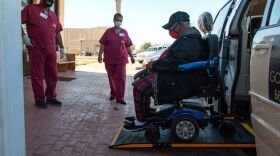
Austin Fast
Austin Fast is the inaugural Roy W. Howard Fellow on ��������'s investigations team.
Before coming to ��������, Fast reported for KJZZ in Phoenix and covered the world's largest wild salmon fishery at KDLG in Dillingham, Alaska. He's also written breaking news at a Cincinnati TV station and taught English overseas with the Peace Corps.
Fast holds a master's degree in investigative journalism from the Walter Cronkite School of Journalism and Mass Communication at Arizona State University and bachelor's degrees in journalism and international studies from Miami University (Ohio).
-
An �������� analysis of data released by the Small Business Administration shows the vast majority of Paycheck Protection Program loans have been forgiven, even though the program was rampant with fraud.
-
Fraud in the Paycheck Protection Program, which gave potentially forgivable loans to small businesses during the pandemic, was largely due to financial technology companies, according to a new report.
-
Fewer than 10% of all Paycheck Protection Program loans remain unforgiven, and the majority of those belong to one-person businesses — companies the program most intended to help.
-
Officials promised a robust review process before forgiving PPP loans, but most loans could be forgiven with a simple, one-page form. Meanwhile, just 2% of loans have gotten close, hands-on reviews.
-
Almost 1 in 10 nurses who were issued new licenses last year waited six months or more, an �������� analysis found. Nurses say patient care suffers as these delays make staffing shortages even worse.
-
Staffing shortages at hospitals across the U.S. are worsened by state boards taking months to process nursing licenses. It's resulted in a huge backlog in nurses waiting for jobs during the pandemic.
-
The CDC's COVID-19 data set is supposed to help track the pandemic, but a new �������� analysis has found the majority of fields are blank and millions of cases across the country are missing altogether.
-
As the delta variant takes over in the U.S., new, localized outbreaks are emerging. Those surges are likely driven by pockets of dangerously low vaccination rates.
-
Cities are leaving rural areas behind in the race to vaccinate against COVID-19, but some states' suburbs are struggling, too. To close the gap experts say, outreach needs to be hyperlocal.
-
As adults of all ages get access to the COVID-19 vaccines, health researchers worry that the trend could worsen.








